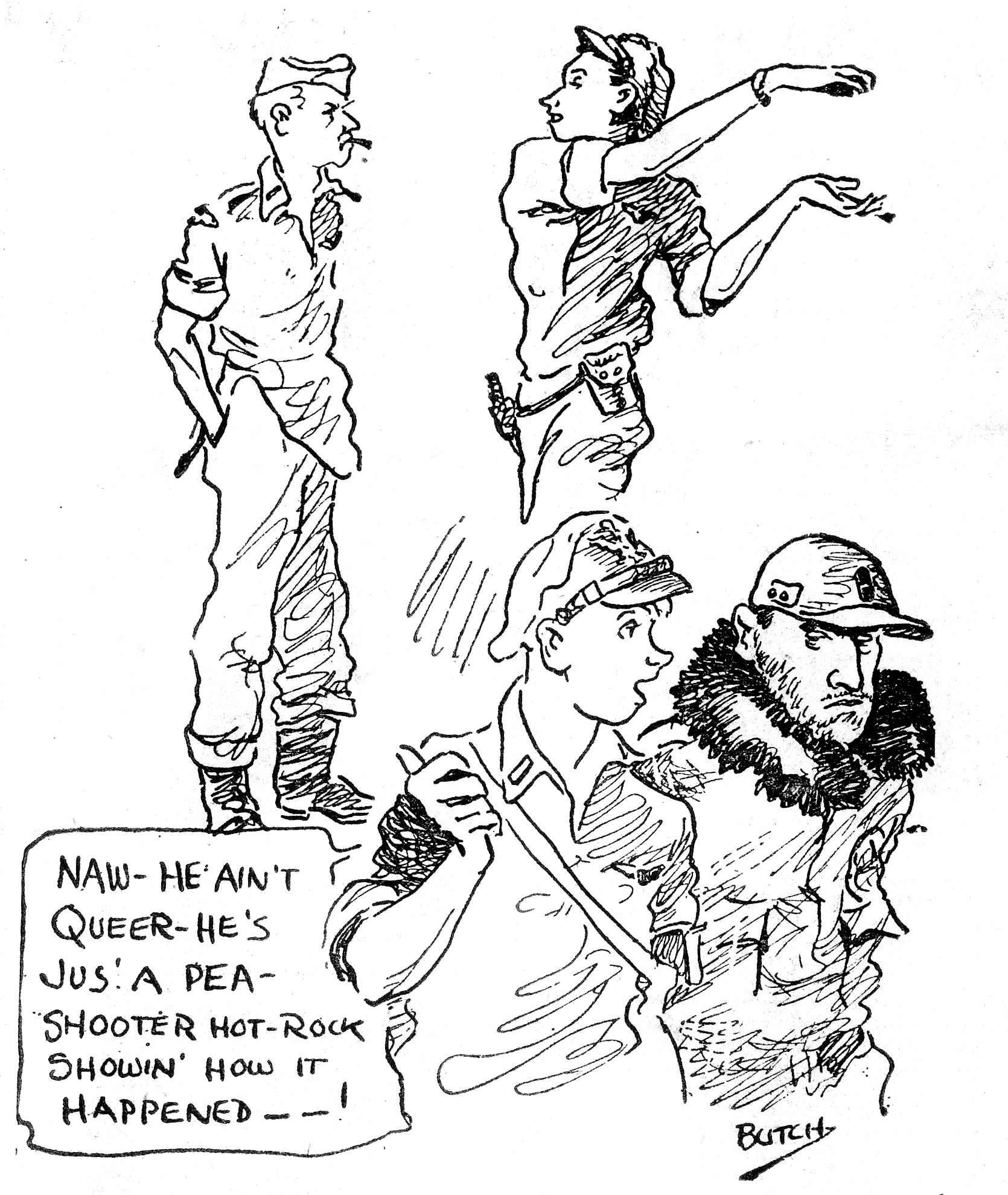
Vol. 1, No. 33 Published by India China Division, Air Transport Command August 30, 1945

Third Fleet Moves Into Tokyo Bay While thousands of Allied prisoners of war cheered carrier-based planes that roared in low over Japan, the vanguard of a huge occupation fleet steamed from Sagrand bay into Tokyo bay Tuesday morning. Led by the U.S. cruiser San Diego, the Allied armada dropped anchor off the Japanese naval base of Yoksobuka. Engineers will improve the water supply and co-ordinate transportation, and the communications men will seize all communications facilities, including harbor and airfield radar equipment. In Tokyo bay, the occupation fleet, under command of Rear Adm. Oscar C. Badger, consists of 112 warships and numerous auxiliary craft. The fleet had dropped anchor in Sagami Bay the day before and sent minesweepers into Tokyo Bay to determine feasibility of bringing in the rest of the fleet. Estimates of the time it would take to occupy Japan indicated that it might be a lengthy affair. A dispatch from Okinawa states that it might take as long as five months to complete occupation plans. As the fleet and aircraft moved in on Japan, Tokyo radio repeatedly advised the Japanese to remain calm "and thereby relieve his Majesty's worries." |
U.S. Mercy Mission Ejected
From Prisoner-of-War Site
By Obstinate Jap Military
Are Willing To Entertain American Representatives But Refuse To Show Prisoners On Demand
By Henry R. Lieberman
(Representing the Combined Allied press)
Keijo, Korea, Aug. 19 (Delayed) - A group of 22 Americans and Koreans landing here on a humanitarian mission to bring medical supplies to Allied prisoners of war were ordered to get out of Korea today by the Japanese military authorities, who brought up tanks and mortars to underline their blunt "invitation" to leave.
The U.S. Army mission, led by Lt. Col. Willis H. Bird, of Lansdowne, Pa., was the first Allied group to land on Korean soil since Pearl Harbor. It arrived in the midst of 50,000 Jap troops yesterday in an unescorted C-47 to make preliminary arrangements for the evacuation of the prisoners as well as to bring them relief supplies.
The mission was met at the Keijo airfield by a group of high-ranking Jap officers, including two identified as Lt. Gen. Yoshio Kotauki, commander-in-chief of Jap forces in Korea and Maj. Gen. Junjire Ihara, chief of staff.
Although the Japanese command permitted the American transport to land at the Keijo field without opening fire, it refused point blank to permit the members of the mission to see the Allied prisoners.
When Col. Bird remonstrated with Col. Hisao Shibuda, liaison officer attached to the group, pointing out that arrangements for swift evacuation of prisoners was covered in the preliminary surrender negotiations, the Japanese brought up two tanks and set up their trench mortars.
Until Bird took a firm stand, the Japanese were non-co-operative about the prisoners, but outwardly hospitable towards the members of this mission. Last night, while the Japanese were still trying to scour up some high octane gasoline for the C-47, Col. Shibuda and Maj. Hideo Uyeda, another General staff officer, went so far as to entertain the Americans with sake and Japanese songs.
"If someone had told me two weeks ago I'd be in a setup like this, I'd have turned him over to the loco ward. It's a dream, or else it's the sake."
Armed with revolvers, tommy guns and some hand grenades just in case trouble developed, the American mission took off from Sian in the blind yesterday without knowing what kind of reception it would get in Korea.
As the mission got within 500 miles of Keijo, the plane's radio operator, 1st Lt. Meredith L. Price, of Charleston, W. Va., tried to establish the first radio contact with the Japs. Col. Bird and Capt. Ryan Hamm, of Cambridge, Mass., broadcast messages ten times, from 9:15 a.m. until the Japanese replied at 11:40 a.m., just as the C-47 had crossed the Yellow Sea.
"We are expecting you," they answered. "We guarantee you safe landing."
As the members of the mission got out of the plane, the Jap generals were waiting. The officer identified as Gen. Ihara, chief of staff of the Japanese forces, did the talking for the Japanese.
"I am here," Col. Bird announced, "at the direction of Lt. Gen. Albert C. Wedemeyer, commander-in-chief of U.S. forces in the China Theater, as an initial pre-Allied occupation representative to bring whatever help is needed to Allied prisoners of war and to make preliminary arrangements for their future evacuation in accordance with the terms of the peace negotiations."
"Then you are not here to negotiate a surrender?" asked Ihara.
"No," said Col. Bird. "Our mission is purely humanitarian; to see that the prisoners are safe and to bring them what immediate help they need."
When Bird asked to be allowed to see the prisoners, Ihara said his troops had gotten a "cease fire" order from Tokyo, but that he had no authority to let anybody visit the prison camp.
"We must wait for orders from our government," he added, "And you must leave. It is not safe for you here."
One glance around the airfield was enough to support the general's contention.
'Inferior Persons'
The generals turned the entire party over to Col. Shibuda, who turned out to be the friendliest of the lot.
|
An unidentified major gave the mission an unsigned "receipt" to show that the mission had arrived in Keijo. When Bird asked the major to get somebody to sign the "receipt" the major - according to the mission interpreter - spouted a stream of profanity and a stinging reference to "inferior persons."
Shortly thereafter, the two tanks were deployed outside the building in which the mission was housed. The mortars were also brought up. At 4:20 p.m. Korean time (3:20 a.m. Eastern War Time) with the tanks' guns at their backs, the 19 Americans and three Koreans in the mission left Keijo.
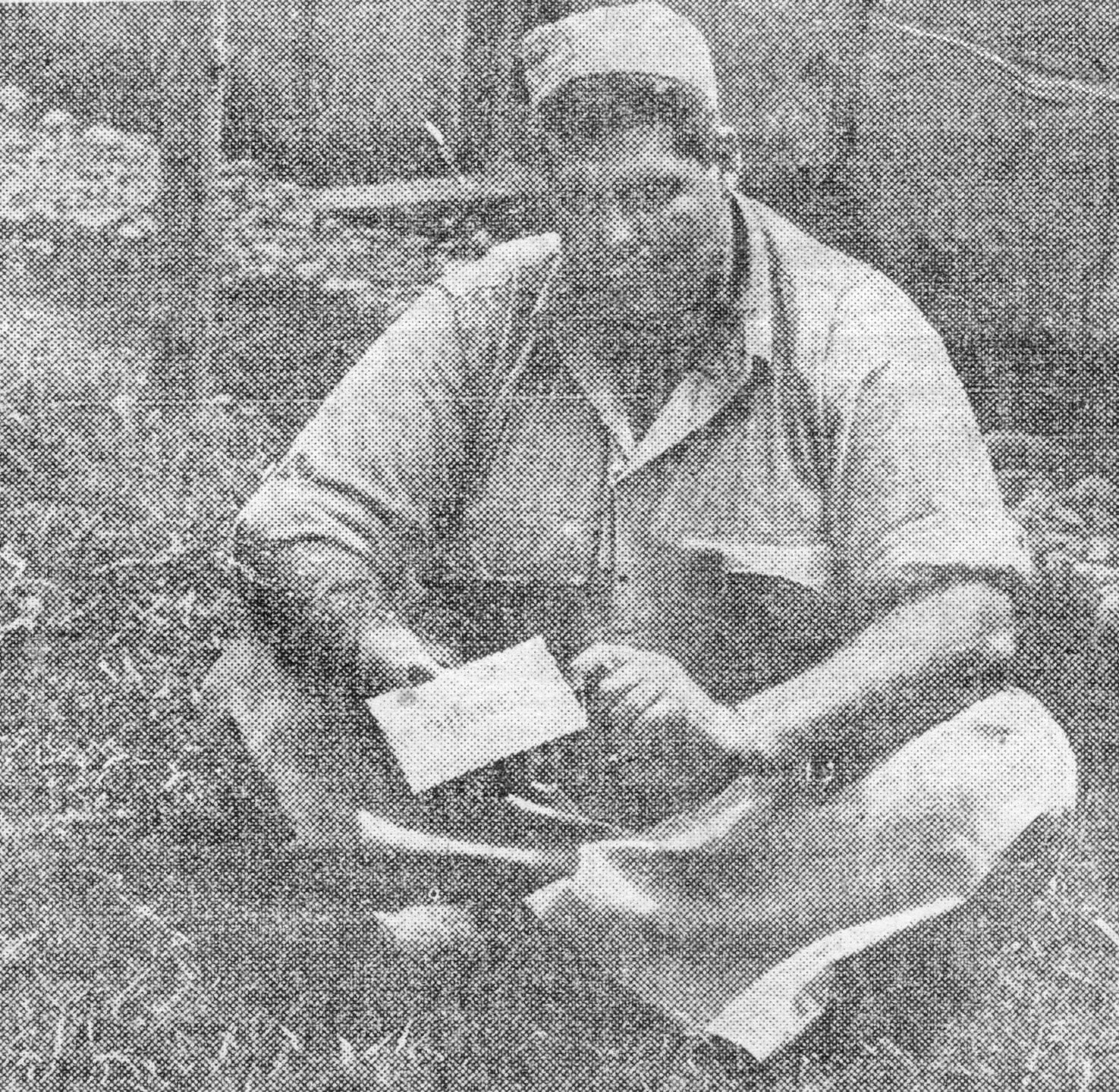 1344 BU, China - Sgt. William H. Crow, Vandergrift, Pa., better known as "Tiny," finds small solace in a K ration - even as a between-meal snack.
Sgt. Crow prides himself upon being the heaviest man in the AAF (265 pounds).
He likes the Army, too, and plans to make it a career. Must be something other than K.
1344 BU, China - Sgt. William H. Crow, Vandergrift, Pa., better known as "Tiny," finds small solace in a K ration - even as a between-meal snack.
Sgt. Crow prides himself upon being the heaviest man in the AAF (265 pounds).
He likes the Army, too, and plans to make it a career. Must be something other than K.
|
New, Lower Critical Score
To Follow Jap Acquiescence
Washington (ANS) - The Army disclosed Saturday that a new and lower critical score for discharge will be put into effect just as soon as it is determined that Japan will abide by surrender terms.
Maj. Gen. Stephen M. Henry, assistant chief of staff in charge of personnel, said the score then will be progressively lowered at a rate guaranteeing that there will be no empty berths on ships returning to the U.S.
Objectors Misinformed
The Army has not made the new score public. However, screening of 75-point men from shipments to the Pacific has clearly pointed to 75 as the next critical figure.
"High point men who claim they are on the way to the Pacific are misinformed," Henry said. "Units sailing from the U.S. recently have been shorn of men with more than 75 points and future units will, of course, be screened to an even lower score."
Interviewed on a Veterans of Foreign Wars radio program by Omar B. Ketchum, national VFW legislative representative, Henry also revealed:
All men with 85 discharge points will be out of the Army by the end of November; 85 point men in the European and Mediterranean theaters should be civilians a month before that.
To Lower Age Limit
Enlisted men with 85 points, now in the U.S., will be sent to separation centers by Aug. 31. Those arriving from overseas will go directly to separation centers.
The present age limit (38) on overseas service will be lowered "as it becomes possible to set a new top age limit for service."
Men with less than the minimum score for discharge may still expect to be sent overseas for occupation duty. The War Department hopes to avoid shipping soldiers with scores near the critical limit.
USAAF Discloses Discharge Figure Under New Plan
Washington (ANS) - Army authorities have disclosed that out of the 2,300,000 men now in the Army Air Forces, more than 1,400,000 will be discharged in the next year under the demobilization program now being put into effect.
Discharges are expected to reach a peak of 150,000 men a month, whittling personnel down to 900,000 in a year's time and to about 700,000 men thereafter as conditions permit.
Overseas airmen with individual high-point scores will be replaced by others with equal training but with lower-point scores, or by volunteers.
Air Supplies Hit New High During War
Truck-Load per Minute Flown to Forces in China
Hq., Calcutta - During the closing days of the war, the 14th AAF, the Chinese-American Composite Wing and American and Chinese forces opposing the Japs in China were receiving nearly two tons - the equivalent of a truck-load - of supplies by air each minute of the 24 hours in a day.
In the last month of full operations, ICD delivered 71,042 tons to China from India. For the first ten days in August, 26,806 tons were delivered. This figure includes tonnage hauled by AAF tactical units attached to ICD for operational purposes.
Reach 348,398 Tons
Only a year ago Army schools were teaching that it was impossible to move such an amount of cargo by air. And only a year ago the figure of tonnage over the Hump was only one third of what it was in July 1945.
In the past year tonnage figures mounted steadily. By November 1944, 34,914 tons of military cargo were laid down in China. The first seven months of 1945 saw total tonnage reach 348,398 tons.
Passenger Service
On Air Force day, Aug. 1, the division showed what air transport could do when 5,327 tons were delivered to China in 24 hours.
At the time cargo delivery was being stepped up, a vast passenger service was being maintained. Over the 28,000 miles of routes flown by ICD, thousands of passengers have been hauled.
ICD's "hotels" at various bases billeted 93,000 transients a month and served them approximately 435,000 meals. Last year 100,000,000 passenger-miles were flown.
Karachi Is Excellent Deal For Home-Bound Soldiers
By Sgt. Sylvester L. Adessa
1306 BU, Karachi - So you're going home?
You've got 26 months, 25 months, 24 months - or less, let's hope - and either your orders are here or you are crossing your fingers and hoping they'll be in shortly. No matter where you are in the ICD, if you're flying home, you'll pass through Karachi and you want to know what's in store for you.
Frankly, it's a pretty good deal. The usual red-tape procedure has been streamlined until it's scarcely recognizable as army-like. The result is that you should be ready for a take-off from 12 to 24 hours after transient personnel wallahs and other processing sections (customs, security) get onto your case - and in any event you shouldn't be hanging around longer than 36 hours.
That's the way it stands now, though a heavier traffic flow in the future may extend the waiting period. The availability of planes and exigencies of flying weather are other factors accounting for most delay.
To Transient Pool
Transient personnel people advise getting your records straightened out and checked at your home base. If your dog tags are missing, your immunization record fouled up or your baggage weight over the prescribed limit (35 pounds for EM, 65 for officers) you'll spend extra hours getting things uncurled.
All orders cut from the home base assign men initially to the transient pool here. That's out in Malir, a sprawling cantonment area about six miles from the airport. Stateside orders for flying personnel are cut here; ground men's orders are sent from division headquarters.
Until your orders are cut and distributed you're on your own. The authorities are pretty good about letting you come and go as you please - they figure that if you miss your plane it'll hurt you more than them.
125 WACs
Karachi is about 16 miles from the transient areas. It's a pretty good town - a lulu compared to the valley villages. You can knock off a steak at places like the Marina, EWO, Allies Cafe and Central Hotel. Or you can catch up with movies you missed two years ago; there are four English-language theaters in town. The Red Cross runs a dance on Friday nights and almost every night you can dance at the Mayfair if you don't mind cutting in. The band there is strictly from hunger so you may want to wait until getting back to Uncle Sugar. Dates are a little on the scarce side, but there's enough "refreshments" to go around.
Lots of Transients
Lots of transients skip the town and concentrate on the airbase proper. The EM club is as active as any. There's something cooking every day and the canteen specializes in a salad plate that's tops for those sultry days. There are 125 WACs - good-looking bunch, too - stationed on the base and if you can recall your Stateside manners you may talk your way into a tete-a-tete over a cup of coffee. Or you can just sit on the porch of the Beacon (EM club) and watch the gals ankle by.
The NCO club runs dances Saturday and Sunday nights and offers a good time the week around.
|
|
|
|
|
|
Agra Battle Still On
Buzzards Challenge Right Of Americans To Fly
1303 BU, Agra, India - Cessation of hostilities with the Japs has had no effect on the battle of Agra. The fight for air supremacy between invading buzzards and ATC aircraft still rages here.
After a heavy rain on Aug. 15, the initial attack came as the enemy swooped down on the field in great numbers and forced a shutdown for several hours. All incoming aircraft had to overfly to Delhi and all routine flights from here were cancelled. Enemy casualties in the first engagement were one bird knocked down, while the Agra force suffered one damaged airplane wing.
Flushed with their first successes, the buzzards have continued to return until their arrival is almost a daily occurrence. One daredevil member of the enemy force flew through the whirling prop and dashed himself against the fuselage near the cockpit of the beacon ship as it came in for a landing.
No effective defense against the suicidal attacks has been found yet. GIs at the base believe that there is no solution to the problem and that they should evacuate to the States and leave the field to the buzzards.
Kunming Operator Brightens His PX With Femme Line
1340 BU, Kunming - Glamor may not be rationed in China - but it's plenty scarce!
Pfc. Jack Everdeen, Alma, Mich., who runs the transient PX here, claims credit for providing a big portion of the little there is.
Besides selling strictly male items, such as razor blades, shaving cream and cigars, his PX is one of the few in China that handles lipstick, nail polish and a number of other feminine aids for which Red Cross girls, nurses and women correspondents are eager.
The GI feels his lady customers aren't the only ones who should be grateful to him - it's his commodities that turns a plain wholesome girl into one who draws whistles!
Recaptured Church Serving as Chapel For American GIs
Advanced Base in China - Recaptured from the Japanese last month, the Emmanuel church of the Bible Christian Missionary Society, in southeastern China is now serving as a U.S. Army chapel.
When the Japanese were retreating before the drive of Chinese armies this summer, they destroyed the church hospital and damaged the church proper, which is constructed in the western motif and is reminiscent of an American country church. Most evidence of Western culture was erased by the Nips before they left the town.
After the Chinese had consolidated their gains beyond the town, American army engineers moved in and offered to repair minor damages to the church. With the aid of a detail of Chinese coolies, American GIs soon had the building ready for religious services.
On July 29, the first mass was said by Chaplain Francis Lynch and the same day Chaplain Sammuel O. Morreale conducted Protestant services for which music was furnished by 12 civilian nurses from Woochow.
|
Auto Manufacturers
Given Green Light
By U.S. Government
Washington (ANS) - The government has thrown open the gates on auto making, telling manufacturers to make as many cars as they can.
The official word for auto makers to go ahead followed a move by Pres. Truman to keep harmony between management and labor by calling a White House conference of representatives of business, labor and government.
New cars will not hit retail agencies with spare tires, as the War Production board said they may roll off the assembly lines with only four tires on wheels.
GPA will announce the ceiling prices for the new cars next week. Prices are expected to be somewhat higher than 1941 prices but about the same as '42 prices.
|
FEUDIN' . . .
The two main transport companies that are doing all the flying around these parts of the world are ATC and Combat Cargo. They have a polite way of feuding with each other which makes for a little comedy in the sameness of the long hours of flying in all kinds of conditions. In the air they sound like they were ready to skin each other's throat. In the mess halls and on the lines they are just good American guys, happy-go-lucky and friendly.
The other day at Nanning an ATC ship was waiting behind a Com-Car plane that was about ready to take off. The ATC boys were in a little bit of a hurry and the pilot called on the radio, "Hey, you COMICAL CHARACTERS, what the h--- are you waiting for? Let's get that hunk of junk into the murk, jerk."
Back over the ether came the answer, "Hole youah hosses, man! Don't you realize you're watching artists at work? And when did Youse Guys start telling us to hurry?"
AIRBORNE . . .
This column is being batted out two miles high as we putt along in a good old Dumbo, the newly-found workhorse of the war. Not that it is a new ship now, but there are some who claim that the C-47 is tops in this cargo-hauling business. True, there are things that a Doug can do that old Curtis Commando can't quite lower herself to try, like getting into small fields and picking up her skirts to skitter through tight valleys and such (on occasions she has seen fit to do even that) but all in all this C-46 is the "queen of the transport trails."
It sure feels good to feel those two P and W's take hold when the pilot gives her the gun on takeoff. And it feels just as good to listen to their steady roar as you fly along.
The plane happens to belong to COM-CAR and - not turning traitor to old ICD - These fellahs of the CC are doing a wonderful job. Just as everybody was in the war together, they're all in the victory together and they're flying right along with the boys that bend the throttles for Uncle George.
On this particular trip there are some Chinese officers and men who are proceeding to undisclosed points east (need more be said?). The pilot, taking it that this was probably the first flight for some of them, and remembering how nasty things can be when passengers get sick, hauled out a big ten-gallon bucket. Placing it in the middle of the plane he looked around at the Chinese. His vocabulary was limited but sufficient.
Making an awful face, he faked a "heave" into the bucket, placed it on the floor and pointed at everybody. "Blaah in here, and not on the floor."
So far his instructions have been heeded.
HEARTS AND . . .
Most everybody who has been to Kunming knows that the city is not too attractive. It is quaint, and interesting, but that's different from being attractive. Without malice toward the people who make it their home, there are times when the atmosphere in the city can be most trying and when the unlimited sea of mud and lanes of kidney-shaking cobblestones drive one to bitterness.
And yet in the middle of all this there is the most wonderful flower circle where the people bring their varicolored beauties to sell to passers-by.
Here, in the poverty that has been China's war for the last eight years, are the red of the brightest carnation, the lavender of the dahlia and the cinnamon yellow of the fragile gladiola. Rows and rows of buds blossom forth into a cacophony of color and for the moment the visitor might dream himself to the flower mart in Paree or the stalls in Fulton market. It sorta proves that, like the love of beautiful flowers, some things are universal, regardless of language, creed or color.
|
In AAF Day Story Contest
Hq., Calcutta - Winner of the Air Force Day contest and a bottle of genuine, unadulterated jungle ration - complete with original contents, cork and seal, and no false bottom - is Maj. G. L. Heaton, 1340 BU, Kunming.
Major Heaton's letter, best in the opinion of the judges, follows:
"The funniest thing that marked AAF day, as far as I'm concerned, took place on a Combat Cargo plane just after it hit the ground here. A swarm of GIs hit the rear door, pounding impatiently and demanding the crew chief open up and let 'em at it. The pilot took his time in the cockpit and then started back towards the door to pick up some chow. The sight of the plane already half unloaded greeted his amazed eyes. "I thought we'd be here about an hour," he complained.
"Better get back and start the engines," a perspiring unloader shouted.
"He stopped, scratched his head in amazement, and as he turned back to the cockpit he could be heard muttering quite plainly, "Good God, it looks like ATC has finally declared war."
"P.S. He was turned around in seven minutes."
Rescue Quartet of Doolittle's Raiders; Four Still Missing
Washington (ANS) - More than three years of agonized uncertainty was ended this week for families of four of Doolittle's Tokyo raiders who were captured by the Japanese in 1942.
"Thank God he's safe - we've waited so long for this news," was the reaction of Mrs. William Maas, of Milwaukee, whose brother, Lt. George Barr, formerly of Queens, N.Y., was one of the four. The others were Lt. Chase J. Nielsen, Hyrum, Utah; Sgt. Jacob D. Deshazer, Madras, Ore., and Lt. Robert L. Hite, Earth, Tex.
The War Department informed families yesterday that the men had been freed by a rescue team which parachuted into Peiping, China, to take them from a prison camp. Still unaccounted for are Lt. William G. Farrow, Washington, D.C.; Lt. Robert J. Meder, Lakewood, Ohio; Lt. Dean E. Hallmark, Dallas, Tex., and Sgt. Harold A. Spatz, Lebo, Kan. The four rescued fliers were captured with them on the same Doolittle mission.
Historical Note: It was later learned that on 28 August 1942, Lt. Hallmark, Lt. Farrow, and Sgt. Spatz were tried and convicted of alleged war crimes. At 16:30 on 15 October 1942, they were taken by truck to Public Cemetery Number 1, and executed by firing squad. The other captured airmen remained in military confinement on a starvation diet, their health rapidly deteriorating. In April 1943, they were moved to Nanking, where Lt. Meder died on 1 December 1943. The cremains of the four missing men were repatriated following the end of the war.
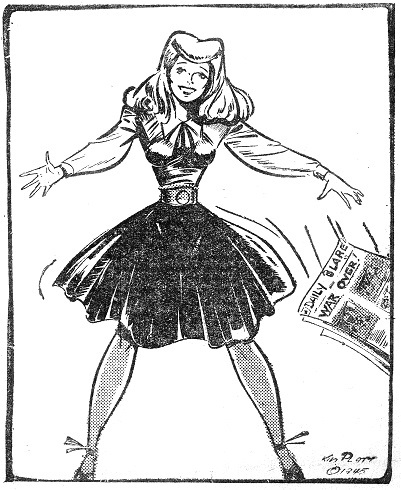
|
Chiang Kai-shek Announces
Kuomintang's Postwar Aim
Chungking (ANS) - Generalissimo Chiang Kai-shek stated Saturday that outer Mongolia should be granted independence, that Tibet should be made autonomous and that the status of Hong Kong as a British crown colony would not be changed without negotiations, the Associated Press reported.
China's major aims are re-establishment of the nation's territorial and administrative integrity in Manchuria, recovery of Formosa and Pescadores and restoration of Korea's independence, Chiang said in a statement which may have been designed in part, AP said, to prepare the people for a new Chinese-Russian treaty.
Terms of the treaty were published in Chungking's Monday morning newspapers. Points of the published treaty are these:
1. Russia to give China moral support and material resources. Such aid will be given entirely to the Chiang Kai-shek regime as the central government of China.
2. Both parties to work "in close and friendly collaboration after the coming of peace and to act according to the principles of mutual respect for the sovereignty and territorial integrity and of non-interference in internal affairs, of the contracting party."
3. Soviet forces will begin to withdraw from Manchuria within three weeks of the Jap surrender and will complete withdrawal within three months.
4. Chinese Eastern railway and South Manchurian railway will be combined to be jointly owned and operated for 30 years at which time the railway will revert to China without compensation.
5. The port of Darien will be free, open to commerce and shipping of all nations under a Chinese mayor and a Russian harbor master.
6. Port Arthur will be used jointly as a naval base with Russia responsible for its defense and China its civil administration.
The treaty runs for 30 years.
Chiang further stated that Burma, Thailand and Indo-China should be given "friendly help in attaining independence in letter and spirit of the Atlantic charter."
|

Take It Easy !
Some fellow GIs who push pencils and pound typewriters in headquarters brought to our attention something we believe is worth passing on.
They were a bit concerned over the reckless abandon which marked some celebrations over the war's end and attitude of some of their fellow GIs since Japan's surrender. They were apprehensive over the fact that men are still raising hob just for the sake of raising hob!
The men asked why we didn't point out the chain of events that such ill-advised activities resulting from thoughtlessness might start. In the case of many, court-martial proceedings may be instituted, and many, no doubt, will be found guilty of disciplinary lapses.
Such trials make extra work for the boys in the squadron orderly room. They also impose additional burdens upon those who take part in the courts-martial - the counsel, the stenographers, the principals. And then the whole slug of paperwork will descend upon the headquarters JAG section and the GIs there will have to shuffle some more paper.
But what of the guy who is guilty? Unless he's luckier than most, he'll probably wind up looking out the guardhouse window, wondering how he could have been so stupid!
The pencil-wallahs wound up by asking:
"Why not just tell the guys to take it easy? If they raise hell, it'll just keep us here longer winding up their cases."
While the case was stated in a tongue-in-cheek manner and the appeal was based on the desire of a few men to get out of here as soon as possible and on a hope that their departure wouldn't be held up by extra work created by thoughtlessness, it sounds like sage advice, in the long run.
Going home is the thought uppermost in the minds of everyone. Ant rush actions, or plain thoughtlessness, which keep men from getting home as soon as possible constitute the lowest form of fun we can imagine.
In many foreign theaters, as well as in the U.S., lives were lost through foolish displays at war's end. On Okinawa six men were killed by rockets, ack-ack and rounds of rifle ammunition fired as a means of celebration. In San Francisco almost a dozen persons lost their lives in riotous festivities.
These affairs, perhaps, were much more serious than anyone would expect to occur now that the first blush of victory has worn off and most of us have settled down to wind up what's left of our jobs and get home! But unless we keep ourselves in check, there may be lesser lapses which will be serious enough in the delay in departure they cause.
Fun is fun, everyone knows that men sweating out a war don't get enough of it! But there must be more pleasant ways of having a good time than grabbing a pistol and starting to pop at something seen through bleary eyes.
Because of the let-down which followed the Tokyo surrender and a loosening of the grim intent which gripped most GIs while the war was going on, there already have been several fights which have made headlines in the world press. Yanks have drubbed Yanks in public spots and Yanks and Britishers have tangled.
The prestige of America is at stake. Generally speaking, there never has been a group of military men who have so captivated the general public of the various lands as the Yanks. True, they have been thought foolish, too free with their money and not as diplomatic as others, but, for the most part, they were well liked. Let's keep it that way.
Perhaps no one in the army would want to be guilty of an overt act which would show the Yanks in an unfavorable light. But thoughtless acts do just that!
With the let-up in pressure in ICD, rest camp facilities and educational opportunities are being stepped up to keep men's minds and bodies occupied in worthwhile, yet pleasurable, pursuits.
Entertainment facilities, too, are being expanded. The ATC entertainment units and the Entertainment Production unit are moving full-speed-ahead on increased and improved show tours. The Area Entertainment guild, in the Kunming neighborhood, is bringing soldier audiences what for many is their first taste of the legitimate stage overseas.
For those who want to go a little deeper than entertainment to while away the hours, USAFI offers myriad courses - self-instruction and classroom style.
But whatever we decide to do with our time, let's follow the advice of our GI friends. Let's "take it easy!"
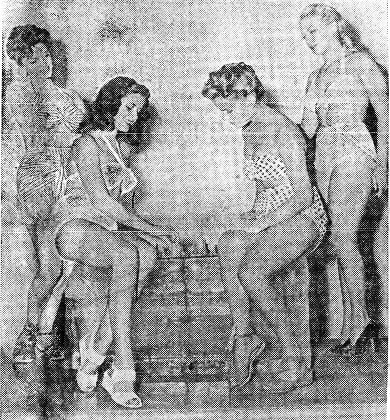 Hollywood - Hot spells don't worry film beauties (left to right) Julie London, Barbara Bates, Daun Kennedy and Jean Trent.
They can pass the time away by indulging in a torrid chess match while seated on ice.
Hollywood - Hot spells don't worry film beauties (left to right) Julie London, Barbara Bates, Daun Kennedy and Jean Trent.
They can pass the time away by indulging in a torrid chess match while seated on ice.
|
Pacific Hop Regular
Run Across China
Calcutta-to-Manila Flights
Inaugurated Last Autumn
Hq., Calcutta - For nearly nine months, ICD planes have flown across Jap lines from advance bases in China straight to the Philippines, it was revealed this week.
Hitherto a military secret, the Calcutta-to-Manila run, which cut flying time from about 50 hours (by way of Ceylon and Australia) first to 12½ hours and recently to less than eight hours, is made public for the first time. U.S.-to-Calcutta flying time, usually more than 65 hours by way of African and Atlantic routes has been reduced to about 40 hours by routes from Manila across the Pacific.
Forman Pilot
In the initial run, from western China to Leyte in the Philippines, Free China was connected with Allied bases in the Pacific by means other than radio for the first time since the Jap seizure of coastal areas early in the war.
Lt. Col. Robert D. Forman, Memphis, Tenn., ICD director of training, piloted the B-24 that made the experimental flight over the new route Nov. 27, 1944. The 1,800-mile flight, in a bomber that carried a full complement of guns and gun crew, was made in 12½ hours. One hour out of Kunming and the bomber was over enemy territory all the way to the Philippines.
Night Flights
Throughout the spring of 1945, a series of additional special missions made test flights to double-check all procedures. Regularly scheduled night flights of C-54s were inaugurated the beginning of May, with planes leaving Calcutta and proceeding directly to Kunming and then to the Philippines, returning by way of China and Myitkyina, Burma. ATC's Pacific division took over in the Philippines and furnished C-54s for through-service to the States by way of Guam.
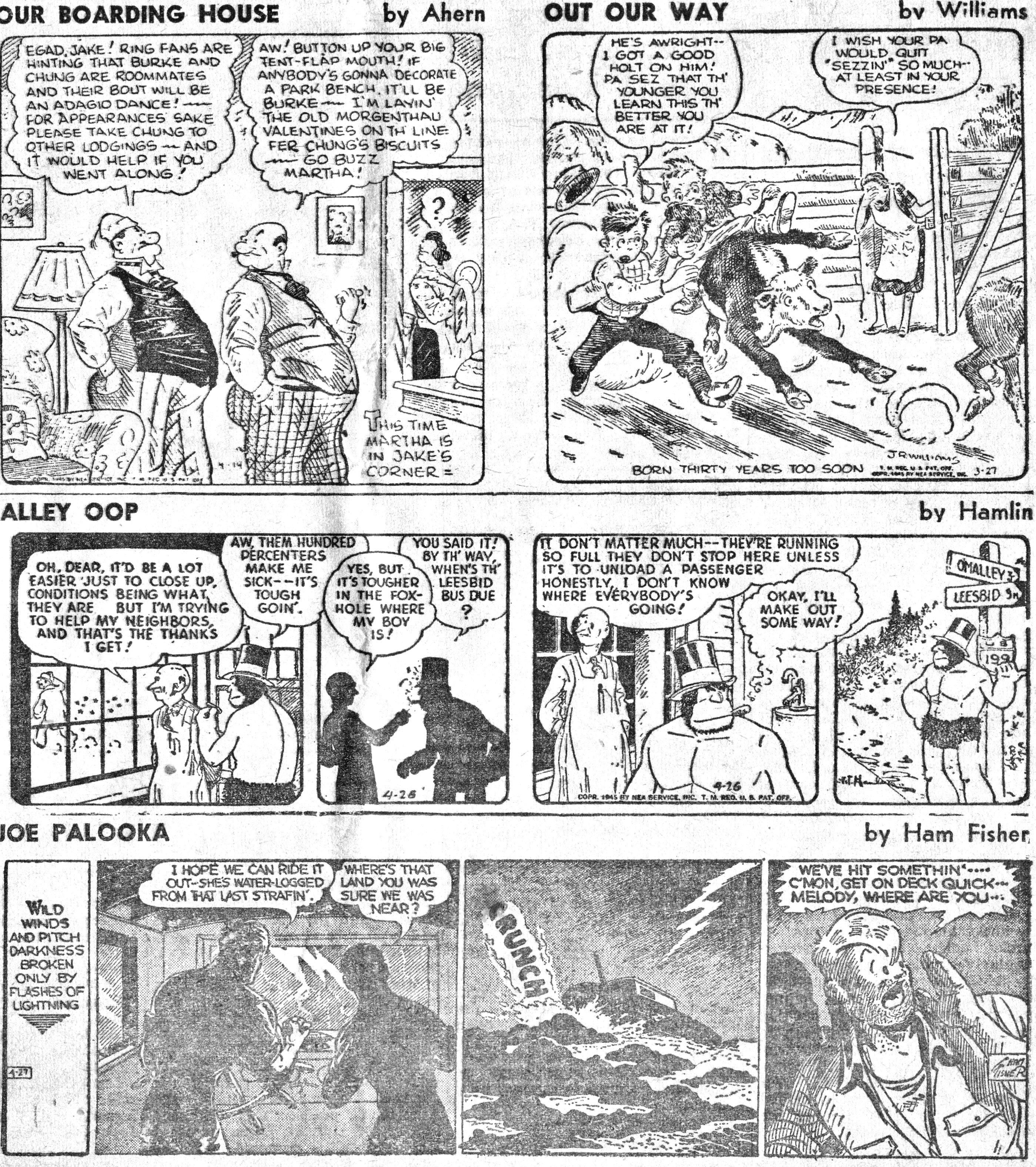
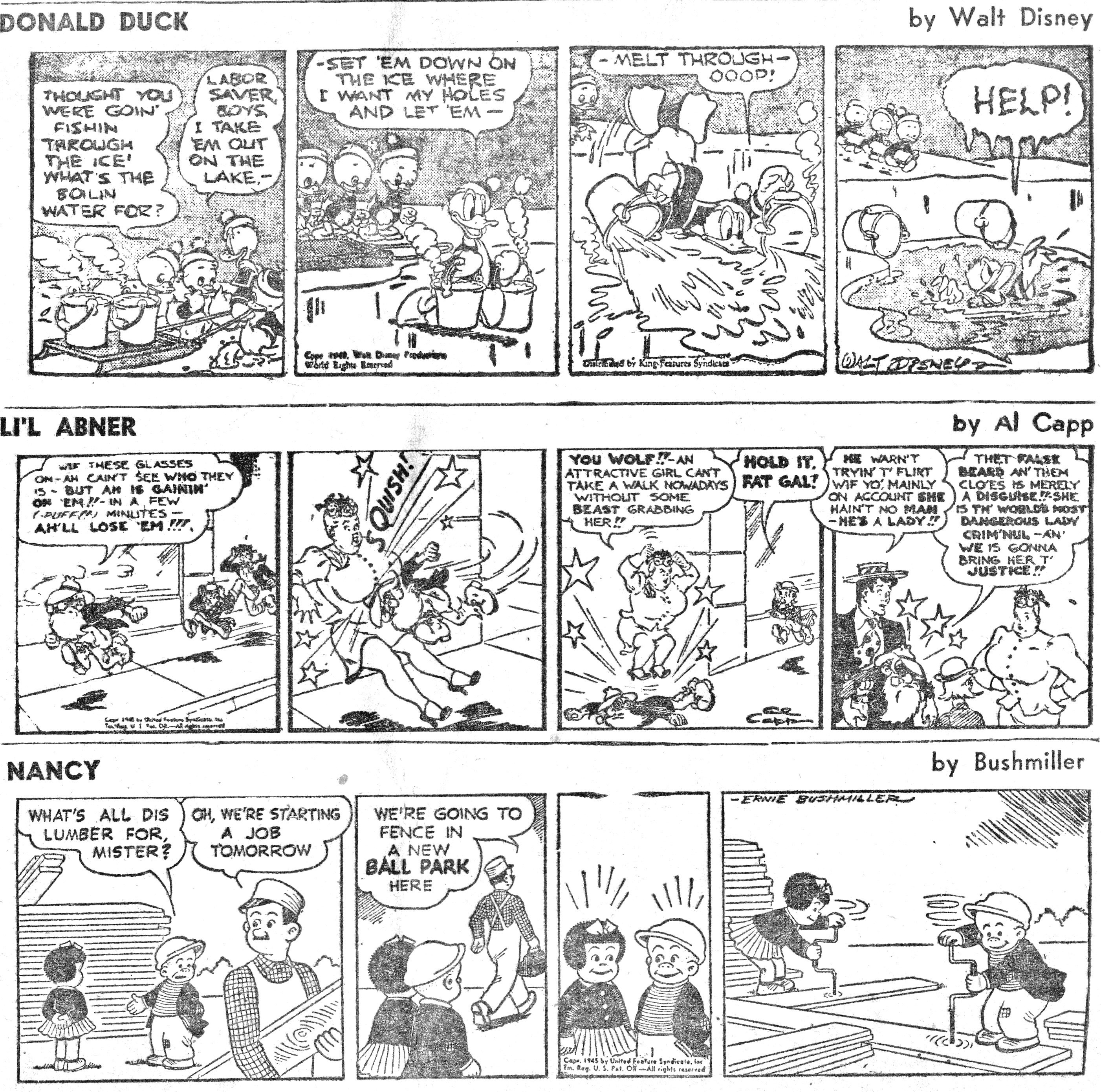
HUMP EXPRESS is the official newspaper of the India-China Division, Air Transport Command, APO 192, c/o Postmaster, New York, N.Y., and is published by its Public Relations office. Camp Newspaper Service and Army Newspaper Service features are used, reproduction of which is prohibited without permission of CNS and ANS, 205 East 42nd St., New York, 17, N.Y. Other material is submitted by staff members, ICD-ATC base Public Relations sections and other soldier correspondents. Printed weekly by the Hindusthan Standard, 3 Burman St., Calcutta, India, and distributed each Thursday. Passed by U.S. Press Censor for mailing.
| Military transport schedules over India for cargo, personnel and mail . . . maximum tonnage of essential war materials over the Hump . . . movement of troops and supplies in support of tactical operations in China . . . evacuation of the sick and wounded - these are the missions of ICD-ATC. |

AUGUST 30, 1945
Copyright © 2015 Carl Warren Weidenburner
TOP OF PAGE PRINT THIS PAGE ABOUT THIS PAGE E-MAIL YOUR COMMENTS
PREVIOUS ISSUE HUMP EXPRESS BASE NEXT ISSUE
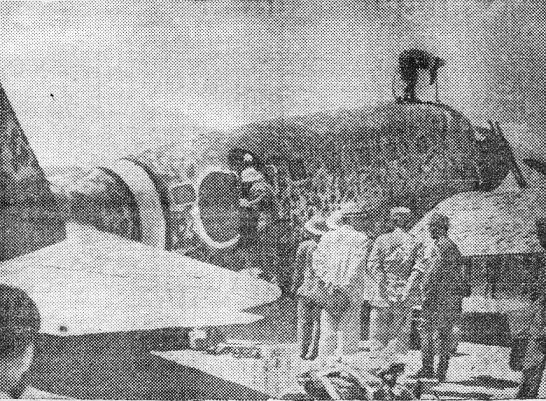 Maj. Gen. Imal Takeo, deputy chief of staff for Gen. Okamura, the supreme commander of Japanese Expeditionary forces in China,
boards his plane after the surrender conference with Allied chiefs at Chihkiang.
The plane, a commercial version of the "Sally," reminded many of the C-47.
Japanese officials and interpreters talk in the foreground.
Maj. Gen. Imal Takeo, deputy chief of staff for Gen. Okamura, the supreme commander of Japanese Expeditionary forces in China,
boards his plane after the surrender conference with Allied chiefs at Chihkiang.
The plane, a commercial version of the "Sally," reminded many of the C-47.
Japanese officials and interpreters talk in the foreground.
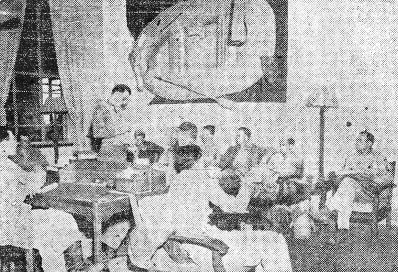 Before men are flown home they are briefed for over-water flight in this waiting room.
Before men are flown home they are briefed for over-water flight in this waiting room.
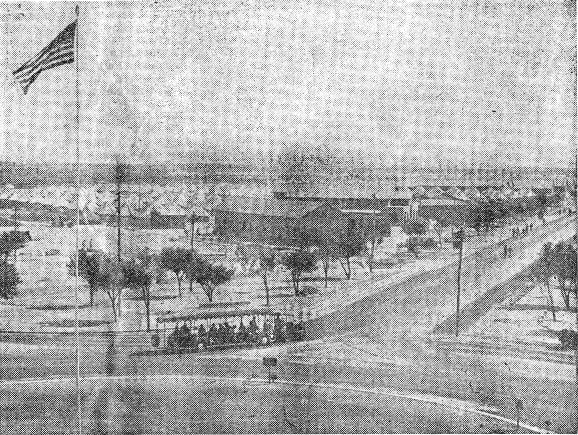 For many soldiers who go home by air this will be the last view of India.
On peak days some 1,200 men can be billeted and processed at this sprawling camp.
For many soldiers who go home by air this will be the last view of India.
On peak days some 1,200 men can be billeted and processed at this sprawling camp.
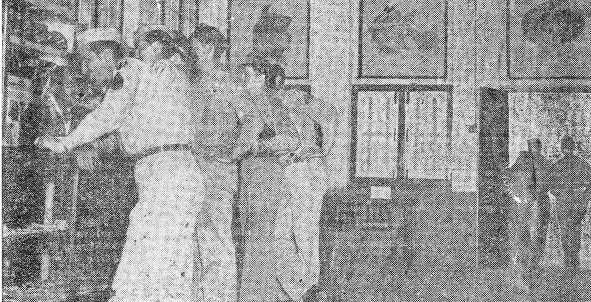 For last minute souvenir hunters, Karachi's post exchange offers a plentiful stock.
Privately owned souvenir shops do a big business nearby.
For last minute souvenir hunters, Karachi's post exchange offers a plentiful stock.
Privately owned souvenir shops do a big business nearby.
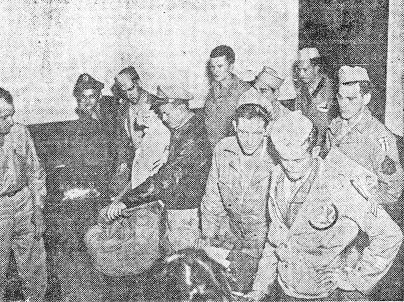 Before departing for the U.S., servicemen have their baggage checked by eagle-eyed intelligence and security officers.
Before departing for the U.S., servicemen have their baggage checked by eagle-eyed intelligence and security officers.
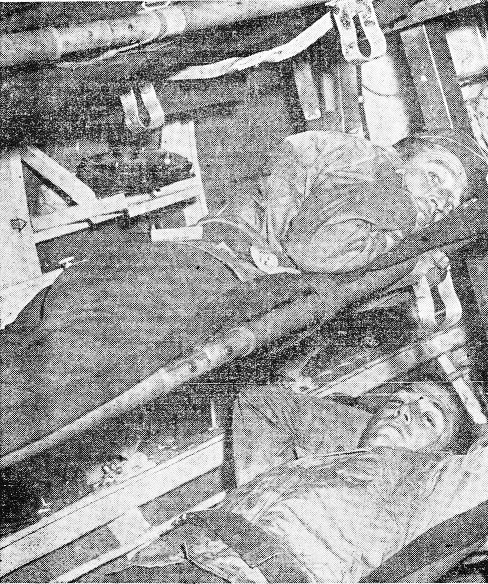 Those who have been lucky won't go home like these "mock" patients.
Medical evacuation planes are an important part of Karachi's out-bound traffic.
Those who have been lucky won't go home like these "mock" patients.
Medical evacuation planes are an important part of Karachi's out-bound traffic.
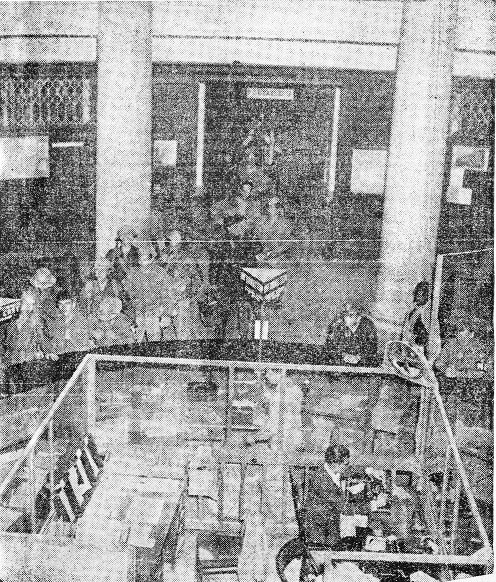 Unlike New York's Grand Central in size but similar in activity, is Karachi's terminal building.
Men stream into this building by the thousands daily.
Unlike New York's Grand Central in size but similar in activity, is Karachi's terminal building.
Men stream into this building by the thousands daily.
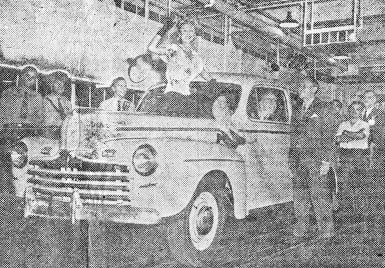 Edgewater, N.J. - Driven by Capt. Eddie Rickenbacker, the first 1946 model civilian passenger car built in the East rolled of the Automobile manufacturers are now authorized to go "all-out" in car production.
They'd probably sell more if they had Carole Landis, "America's GI Sweetheart," as a permanent hood ornament.
Edgewater, N.J. - Driven by Capt. Eddie Rickenbacker, the first 1946 model civilian passenger car built in the East rolled of the Automobile manufacturers are now authorized to go "all-out" in car production.
They'd probably sell more if they had Carole Landis, "America's GI Sweetheart," as a permanent hood ornament.
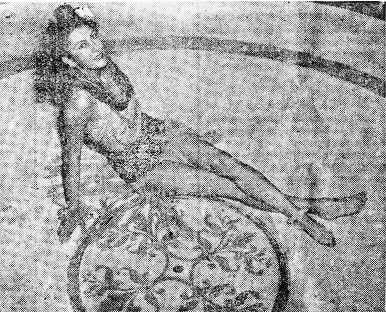 Wynn Farmer, 1305 BU passenger terminal employee, relaxes in the shadow of the Taj Mahal at Agra.
They tell us folks come from thousands of miles to see... er, the Taj. Slick design, huh?
Wynn Farmer, 1305 BU passenger terminal employee, relaxes in the shadow of the Taj Mahal at Agra.
They tell us folks come from thousands of miles to see... er, the Taj. Slick design, huh?
